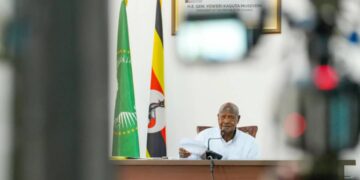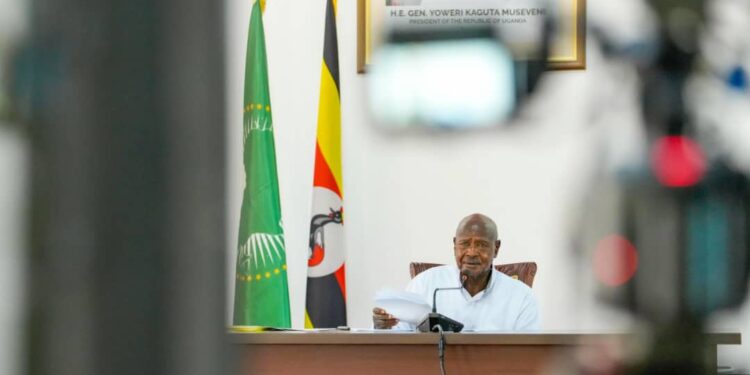President Yoweri Kaguta Museveni has reiterated the urgent need for a sustainable, African-led solution to the Libyan crisis during a virtual meeting of the African Union (AU) Peace and Security Council (PSC), which he chaired in his capacity as Council Chairperson for the month of July.
The high-level meeting focused on the current situation in Libya and was attended by regional leaders, diplomats, and representatives of the AU Commission. A communique was issued by the PSC Secretariat, outlining the collective position of the Council. However, President Museveni also made seven key points, underscoring the continent’s responsibility to act decisively.
President Museveni began by commending H.E. President Denis Sassou Nguesso of the Republic of Congo for his diligent work as Chair of the AU High-Level Committee on Libya. “We thank him for the great work done so far in steering the search for peace,” he said.
He emphasized the following key positions:
- Ceasefire Must Be Maintained: President Museveni stressed that military conflict is not a solution and urged all parties to uphold the ceasefire.
- No Foreign Meddling: He condemned interference by external actors, calling for the sovereignty of Libya to be respected.
- Withdrawal of Foreign Fighters and Mercenaries: The Ugandan leader demanded that all foreign combatants and mercenaries immediately leave Libyan territory.
- Inclusive Dialogue: He called for all Libyans to be included in the national dialogue process, under the facilitation of President Sassou Nguesso and other appointed mediators.
- Free and Inclusive Elections: Museveni proposed national elections open to all Libyans as the most viable path to restoring order—“as it has been for all other countries,” he said.
- African Responsibility: He criticized the continent’s inaction on Libya’s prolonged instability. “It is a shame that Africa has allowed this criminal activity to go on. We ought to get together and do something about Libya,” he stated.
The meeting underscored the AU’s commitment to restoring peace, sovereignty, and governance in Libya, a country that has remained mired in conflict since the 2011 intervention that led to the ousting of longtime leader Muammar Gaddafi.
President Museveni’s leadership at the helm of the Peace and Security Council this July comes at a critical time for regional peacebuilding efforts. His remarks have added renewed urgency to Africa’s call for homegrown solutions to the continent’s security challenges.









